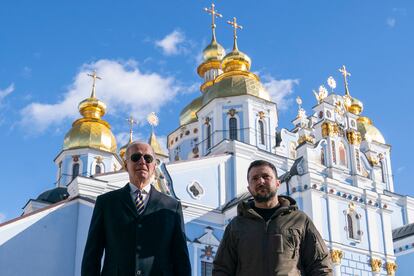Biden in Kyiv
The powerful symbolic meaning of the US president’s visit is inseparable from military support for Zelenskiy

There has been no other presidential gesture showing as much commitment to the Ukrainian cause as US President Joe Biden’s surprise trip to Kyiv. The risks were present both on the train ride from Poland and in his meeting with President Zelenskiy and their walk through the center of a city at war, under the wailing of air raid sirens. It was his first visit to the country since the invasion, this time also in his capacity as commander-in-chief of the US Army and chief supplier of the bulk of the weapons and ammunition that Ukraine needs to repel or neutralize Russian offensives. In Kyiv, Biden reiterated his unlimited support for Zelenskiy and announced a new military aid package of $500 million (€470 million).
The images of both presidents strolling around Maidan square, the memorial wall to fallen combatants and the golden domes of St. Michael’s Cathedral, 24 hours before the announced presidential visit to Warsaw, caught international commentators off guard, especially those working for media outlets close to the Kremlin who insisted that the visit demonstrates Ukraine’s subsidiary role in a war they intend to wage directly against the United States and NATO. This week marks the first anniversary of the war started by Putin and there are many voices demanding peace negotiations, adding to which is Beijing’s announcement of an initiative that it wants to submit to the United Nations Security Council and which has been received with notable suspicion by Western foreign affairs departments.
Although the trip was decided on Friday at the White House and was planned with extreme secrecy, a few hours earlier the National Security Adviser, Jake Sullivan, had entered into communication with Russian authorities, with the full assurance that no one in the Kremlin would dare to take advantage of the 10-hour train ride from the Polish border to Kiyv and Biden’s stay in the capital to attack the presidential entourage. The sudden presidential trip and the extreme cordiality between the two leaders set the tone for Biden’s position, expressed even in the blue-and-yellow striped tie he wore with the colors of the Ukrainian flag. It represents the toughest line against Putin, clearly expressed at the Munich Security Conference in the debate between US Secretary of State Antony Blinken, Ukrainian Foreign Minister Dmytro Kuleba, and also by the combative German Foreign Minister, Annalena Baerbock, whose views openly differ from those of German chancellor Olaf Schloz and the more nuanced position of the French president, Emmanuel Macron.
The government in Kyiv is convinced, according to its spokespeople in Munich, that the necessary condition for defending against Putin’s attack is for the allies to desire it and work towards that end, translatable in terms of full recovery of Ukraine’s sovereignty and territorial integrity, and even in security conditions that would prevent Russia from launching another similar aggression. This is also Washington’s position, as can be deduced from the high symbolism of this truly historic visit to a capital at war and at a particularly decisive moment, just ahead of the spring season that will in all probability increase the intensity of the war. Hence the military significance of the president’s commitment to Ukraine, at a time when a huge ground offensive is expected with which Putin intends to attack at all points on the front until he can open a breach in Kiyv’s defenses.
Sign up for our weekly newsletter to get more English-language news coverage from EL PAÍS USA Edition
Tu suscripción se está usando en otro dispositivo
¿Quieres añadir otro usuario a tu suscripción?
Si continúas leyendo en este dispositivo, no se podrá leer en el otro.
FlechaTu suscripción se está usando en otro dispositivo y solo puedes acceder a EL PAÍS desde un dispositivo a la vez.
Si quieres compartir tu cuenta, cambia tu suscripción a la modalidad Premium, así podrás añadir otro usuario. Cada uno accederá con su propia cuenta de email, lo que os permitirá personalizar vuestra experiencia en EL PAÍS.
¿Tienes una suscripción de empresa? Accede aquí para contratar más cuentas.
En el caso de no saber quién está usando tu cuenta, te recomendamos cambiar tu contraseña aquí.
Si decides continuar compartiendo tu cuenta, este mensaje se mostrará en tu dispositivo y en el de la otra persona que está usando tu cuenta de forma indefinida, afectando a tu experiencia de lectura. Puedes consultar aquí los términos y condiciones de la suscripción digital.









































